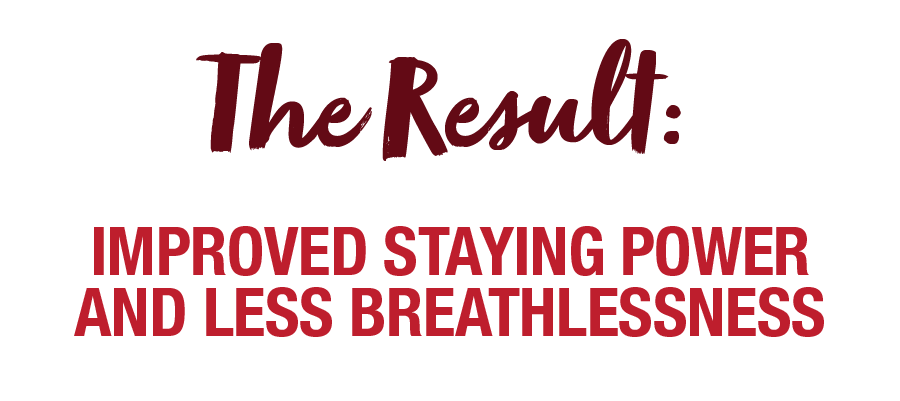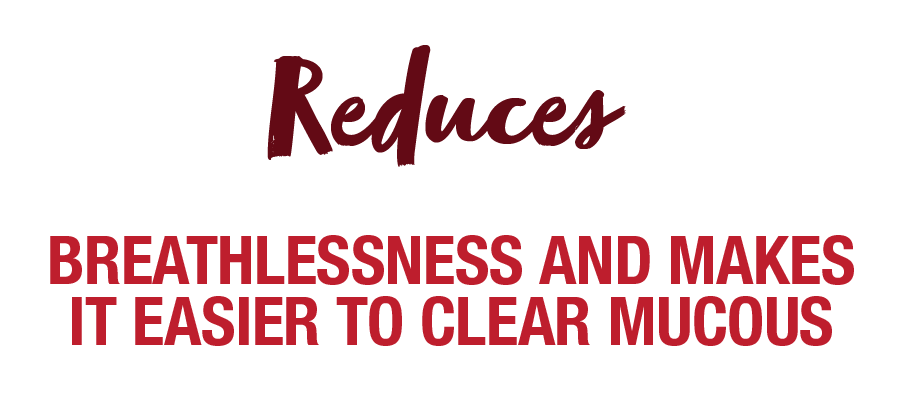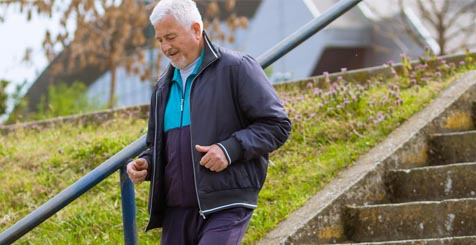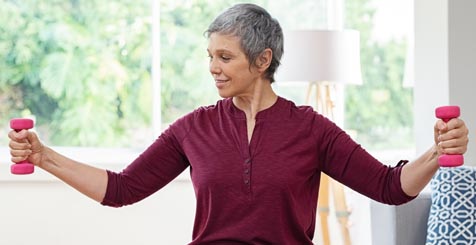When you’re used to struggling for breath, the prospect of exercising probably doesn’t seem that appealing, either consciously or subconsciously. In fact, it may even seem overwhelming or downright scary. But if you have a chronic lung condition, it could be time to think again. There are lots of good reasons to keep an open mind – and the possibility of improving your symptoms should be a real incentive. So what are the benefits of exercise for a lung condition?
Your muscles will need less oxygen
A typical consequence of a serious lung condition is that you end up doing less and getting out of shape. There’s a physical consequence to that, as weak muscles need more oxygen. Simply put, the less you do, the weaker your muscles get and the shorter of breath you’ll become during simple everyday tasks such as going up a flight of stairs, shopping, or cooking.
Exercising can flip this problem by making muscles stronger so daily activities get easier. When you exercise, your heart and lungs have to work harder as your lungs bring oxygen into the body. This gives you energy while getting rid of carbon dioxide, and the heart pumps the oxygen to the muscles that are working.
When you exercise, everything starts to work better.
Exercise involves both your lung capacity (how much oxygen you use) and your lung function (how you use the oxygen). You won’t be able to reverse the loss of lung function if you have a condition like COPD – sometimes known as chronic bronchitis or emphysema – as it causes breathing to take more energy. But regular exercise will help you to take more oxygen on board through increased lung capacity. The result: improved staying power and less breathlessness.

If you have stable asthma, there is some evidence that regular exercise may improve your resting lung function, too, and help you control your asthma.
Whatever your condition, exercise will boost your immune system, meaning that you’ll be better able to fight colds and viruses.
Your quality of life will improve
As you start to do more exercise, you’ll gain a sense of control and your overall quality of life will get a boost. A regular dose of the natural feel-good endorphins that exercise brings will lift your mood. It won’t be long before you start to see the physical benefits and you can take pride in your achievement.
Building more activity into your routine is a lifestyle approach that will help your overall wellbeing, allowing you to do more at home and with friends and family. Once you commit to being more active, it’s important to stick with it to keep the benefits – and, hopefully, you’ll want to.
One study of an in-home exercise programme designed for people with COPD showed positive results in just two months. Interestingly, the greatest difference for participants involved improvements in depression and dyspnea (laboured breathing), demonstrating the benefits for both mental and physical health.
You’ll reduce the risk of hospital admission
The harsh reality is that low levels of activity are associated with poorer health outcomes. With COPD, for instance, you might be reluctant to deal with the discomfort of being short of breath – but the less active you become, the weaker and less oxygen-efficient your muscles will get. The less you do, the harder work any kind of activity becomes and it’s easy to get caught in a downward spiral.
Similarly, lack of activity can cause cystic fibrosis to progress. On the other hand, regular exercise helps to develop breathing muscles and lung function, reduces breathlessness and makes it easier to clear mucous.

Feeling out of breath isn’t harmful
When you’re worried about taking in enough air during exercise, fear-avoidance is understandable – but don’t let that stop you. Why not face your fear?
As you exercise, you will find breathing becomes less easy. That’s just for the duration of your activity and isn’t likely to be harmful, especially if you ask for and follow medical advice from someone you trust. Temporarily having less lung function as you exercise simply means that you use more of your oxygen reserves. Build up what you do gradually. As you become accustomed to exercising successfully, your anxiety level should drop.
All kinds of lung condition can benefit from more exercise, and your doctor will be happy to point you in the right direction if they haven’t already made recommendations. Even just reducing the amount of time you spend sitting down can be beneficial, so it’s fine to start small with achievable goals.
Have we convinced you yet? Any physical activity counts as exercise – and we’ve got some great suggestions for you here.
Medical information. This is provided for informational purposes only and is not meant to be a substitute for advice by a doctor or other qualified healthcare professional. Patients should not use the information on the Active Patients website for diagnosing a health or fitness problem or disease. Patients should always consult with a doctor or other health professional for medical advice or information about diagnosis and treatment. Never ignore professional medical advice because of something you have read on Active Patients.






